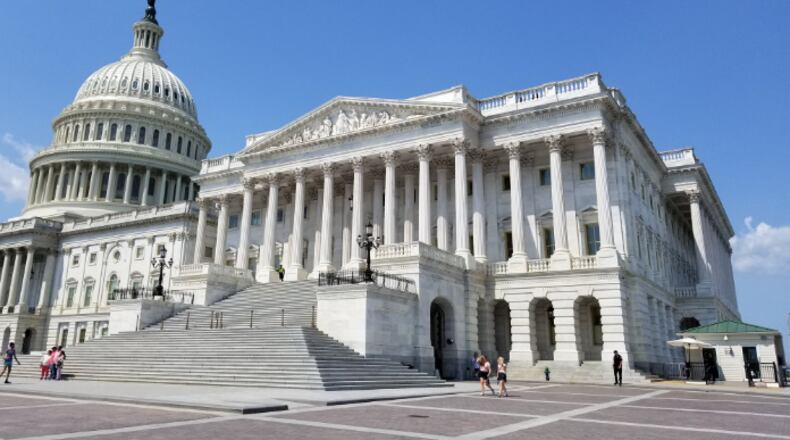Since the fall of 2017, Congress has approved a dozen short term extensions of the flood insurance program - but lawmakers have been unable to find the magic political formula on how it should change.
"This ridiculous process has created significant uncertainty," said a bipartisan group of Senators in a letter last month, as they put forward a series of ideas, including more debt-forgiveness for the NFIP.
Outside groups have also made clear their frustration with the lack of progress on broader reforms.
"After eleven short-term extensions, communities and residents at risk deserve certainty and stability," said the group SmarterSafer.org, which has advocated for a more risk-based approach, so that 'those most at risk bear the costs and understand their real risks.'
A number of different ideas have been floated from both parties on how best to reform the NFIP - but major changes are controversial - like increasing insurance rates on those living in areas at high risk from flood damage, which for some is not a politically acceptable solution.
Ironically, approval of the disaster bill - with the next extension of the NFIP - came as a convention was underway in Washington on the flood insurance issue.
#NFIP Reform and Reauthorization? Where Do We Go From Here? Great panel discussion on how current House and Senate progress toward passing a long-term reauthorization of the #NFIP and potential reforms to it. #NFC19 pic.twitter.com/VEV5fZru3v
— American Property Casualty Insurance Association (@TeamAPCIA) June 3, 2019
We need to make sure #floodinsurance is affordable, that people understand their true risk, that we’re investing in mitigation, & more people have flood insurance. Learn more about our 2019 priorities: https://t.co/kJZTs5kMGn #NFIPreform #NFIP @GNOinc
— CSFI (@CSFIUSA) June 3, 2019
Outstanding talk given by Dr. Lackey, owner of the Sand Palace in Mexico Beach talking about his home’s construction & resilience during Hurricane Michael. Fantastic start to Day 1 @TeamAPCIA #flood conference.
— True Flood Risk (@TrueFloodRisk) June 3, 2019
Listening to presentation by Dr. Lebron Lackey on the building of his #sandpalace of Mexico Beach. Stunning images. Increasing building costs by 15-20% can mean the difference between your home being a total loss and surviving a cat 5 #hurricane like Michael. Staggering. pic.twitter.com/yzTevzlLUh
— Lauren Pachman (@Lauren_Pachman) June 3, 2019
Since being created in 1968, the NFIP had been able to cover most losses - but the damages in 2005 to insured properties starting with hurricanes Katrina, Rita, and Wilma overwhelmed the fund, forcing Congress to cover billions in payments which had to be made to those with insured properties.
In October of 2017, Congress went so far as to simply cancel $16 billion in debt from the flood insurance program - which still owes the federal treasury about $20 billion.
Some want reforms to mix in more coverage from the private insurance market, arguing that better flood maps produced by the feds could allow for flood policies to be offered as an alternative to having taxpayer money on the hook for losses due to severe flooding and hurricanes.
And the Trump Administration has pressed for changes which would give officials the power to deny coverage for properties which frequently flood, as critics say taxpayers should not foot the bill for multiple rebuilding efforts at the same location.
Earlier this year, a House panel held a hearing on a series of different plans to reauthorize the flood insurance program - but there's no evidence of any broader deal being realized at this point.
Because of that - and because of the uncertainty surrounding the disaster relief package which has been stuck in the Senate for months - lawmakers want the extra time through the end of September to see if they can strike a deal.
But, those efforts have been going on now for almost two years, with no legislation to show for it.
You’ve seen this movie before: the House passes a bill extending the National Flood Insurance Program, now to September 30. Since the NFIP expired on 9/30/17, Congress has passed 10 short-term extensions and even allowed it to lapse twice during shutdowns. https://t.co/iUzxeIPf8q
— Steven Meyerowitz (@InsCoverageLaw) May 16, 2019
"I will continue working for a five year reauthorization of NFIP that is affordable for ratepayers, protects taxpayers, and offers families more choices when purchasing flood insurance," said Rep. Steve Scalise (R-LA), the number two Republican in the House.
"This program has over 5 million policyholders who have come to rely upon it, but it is also a flawed program that is in need of a customer based set of reforms," said Rep. Patrick McHenry (R-NC) on the House floor in May.
But what exactly those reforms should be remains a political puzzle, as lawmakers will have until September 30 to strike a deal - or they will have to seek another short term extension of the flood insurance program.
About the Author
